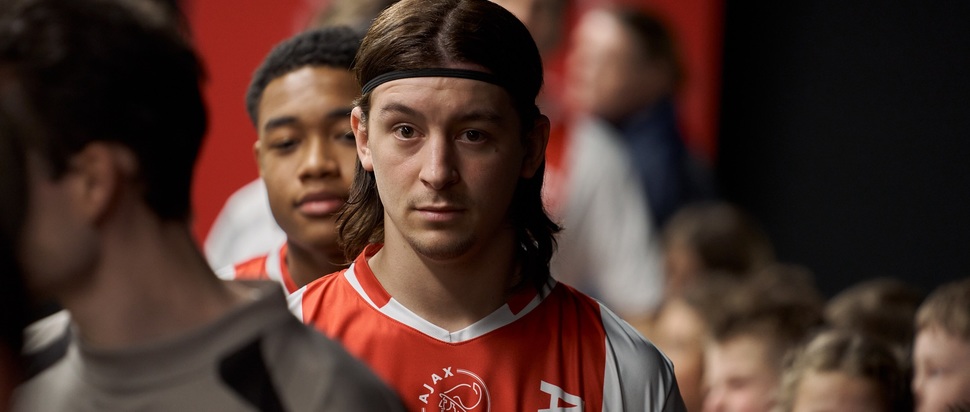The Beautiful Game on the Silver Screen
With a biopic of the self-mythologising Swedish striker Zlatan Ibrahimović heading to cinemas, we look back at the history of the beautiful game on screen
| 06 Jun 2022
It may be the most-watched sport on the planet but translating association football to film has been a funny old game. Despite being a topic in moving pictures for over a century, bringing football to life on screen remains a challenge. When director Jens Sjögren revealed he was going to make a biopic about iconic striker Zlatan Ibrahimović, he was asked if he was suicidal. That film, I Am Zlatan, is released in the UK this month and follows the titular Swede from childhood to his 2004 transfer to Juventus. As far as football dramas go, it works well, perhaps because the filmmakers cast a footballer, Granit Rushiti, in the lead, rather than an actor. While the primary interest may be in what’s happening off the pitch, a lot of the film takes place during training sessions and youth matches, which feel far more natural and convincing than is typically the case.
I Am Zlatan is perhaps a bit of an outlier as, in recent times, football films have been dominated by documentaries. On one hand are player profiles: Ibrahimović was himself the subject of Becoming Zlatan (2015); contemporaries have inspired the likes of Messi (2014) and Ronaldo (2015); while legends of the game headline films such as George Best: All by Himself (2016) and Diego Maradona (2019). The past few years have also seen the rise of long-form behind-the-scenes series like Sunderland Til' I Die (2018) and the ongoing All or Nothing series (2018-). However, history is littered with different depictions of the beautiful game on the silver screen which could be roughly split into three approaches.
The first of these depicts the action on the pitch. Typically accompanied by the challenges the protagonists face in their lives, they often draw attention to the democratic opportunity offered by footballing success. This is where we might find the likes of When Saturday Comes (1996), in which Sean Bean played a brewery worker given his shot at the big time. Elsewhere, Stallone and Bobby Moore took on the Nazis in Escape to Victory (1981); Kuno Becker starred as Santiago Muñez in the rags-to-riches fable, Goal! (2005); Gael García Bernal and Diego Luna played battling brothers from rural Mexico competing for success in Rudo y Cursi (2008); Parminder Nagra fought both social convention and the opposition in order to play the game she loved in Bend It Like Beckham (2002).
Somewhat more fantastically, Stephen Chow reunites the disciples of his old master to harness their unique talents and bring martial arts to the masses in the raucous Shaolin Soccer (2001). In the documentary mode, Douglas Gordon and Philippe Parreno’s Zidane: A 21st Century Portrait (2006) focuses on the physical side of things, tracking the French midfielder over the course of a single match in 2005, hypnotically presenting the heights of elegance and ugliness in close-up.
In the dugout sits Tom Hooper’s biopic The Damned United (2009), charting Brian Clough’s (the chameleonlike Michael Sheen) short-lived tenure as Leeds United manager. At the other end of the spectrum, Ricky Tomlinson was Mike Bassett: England Manager (2001) in a satirical mockumentary and Jason Sudeikis is currently charming everyone as the eponymous Ted Lasso (2020-) in the award-winning comedy.
Up in the stands, one might come across Colin Firth sporting an Arsenal scarf in the Nick Hornby adaptation, Fever Pitch (1997), or Sima Mobarak-Shahi as an unnamed girl desperately trying to circumvent the ban on female spectators to watch the match between Iran and Bahrain in Jafar Panahi’s excellent Offside (2006). Two vastly different films but linked by the feverous passion of the football supporter – the less said about the ‘fandom’ portrayed in The Firm (1989) or Green Street (2005) the better.
Then we come to films that approach football from an angle slightly more askew. Silent caper Harry the Footballer (1911) depicts a kidnapped player being rescued by a daring female fan; The Arsenal Stadium Mystery (1939) goes one further – a star player is murdered and a detective must solve the crime; Ken Loach’s Looking for Eric (2009) sees a football-mad postman receive personal advice from Eric Cantona after a potent joint; Diamantino (2018), meanwhile, is a slapstick tale of an empty-headed star who unwittingly becomes the poster boy for a nationalistic political campaign. In a duo of football docs, director Corneliu Porumboiu explores the subtext of the Bucharest derby in The Second Game (2014) and engages in some leftfield revisions of the rules in the entertaining Infinite Football (2018).
The 2017 documentary Untitled features a sequence where amputees play football on the beach accompanied by a voiceover recalling filmmaker Michael Glawogger’s experience of being unable to communicate with some local boys in West Africa. Their only shared vocabulary is footballers’ names, and he proposes a new dialect: “…instead of ‘he,’ ‘Rooney’ because he is the most masculine… instead of ‘winner,’ ‘Drogba’ because he really is one.” It’s a silly idea, but it gets at something that all of these football films trade in: cultural recognition. Whether they are about the political anxieties of 80s Romania or WW2 derring-do, whether they are set in contemporary Iran or 30s London, or whether their stars are fictional airheads or real-life icons, football offers a fast and relatable route into the subject.
On reflection, Glawogger’s observation about the potential of football as a universal language doesn’t seem so far-fetched. Surely Zlatan would agree.
I Am Zlatan is released 3 Jun by Signature Films
